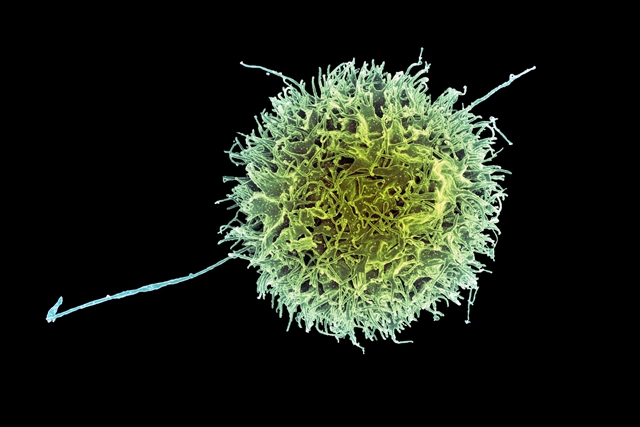6 Dec. 2023. A developer of treatments for cancer and autoimmune disorders from stem cells says FDA cleared its request to start a clinical trial of its therapy for systemic lupus erythematosus. Century Therapeutics, a biotechnology company in Philadelphia, says the Food and Drug Administration authorized a study of its experimental drug code-named CNTY-101, already in an early-stage trial for B-cell lymphoma, a blood-related cancer.
Systemic lupus erythematosus or SLE is the most common form of the chronic autoimmune disease lupus. An autoimmune disorder occurs when the immune system attacks healthy cells or tissue rather than an invading pathogen. In the case of SLE, connective tissue like joints or skin are affected, with symptoms like arthritis pain or skin rash, but also hair loss, sores, swollen glands, fatigue, and inflammation of linings of the heart or lungs. The disease can also lead to kidney damage, heart disease, and breathing difficulties. SLE is a complex disease, with no known single cause, but believed to be a combination of genetic and environmental triggers.
Century Therapeutics is a five year-old company spun-off from labs at Massachusetts General Hospital in Boston and Stanford University in Palo Alto, California. Immunologist Marcela Maus at Mass. General and Harvard Medical School, one of the company’s scientific founders, studies the biology and engineering of T-cells in the immune system as cancer therapies, while cell biologist Hiromitsu Nakauchi at Stanford medical school, also a scientific founder, investigates clinical applications of stem cells. Century Therapeutics licenses technology for stem cell transformation and production from Fujifilm Cellular Dynamics in Tokyo. Science & Enterprise reported in July 2019 on the company’s raising of $250 million in its first venture round.
Gene edits to evade immune detection
CNTY-101, Century Therapeutics’ lead product, is made from off-the-shelf induced pluripotent stem cells, also known as adult stem cells, transformed into natural killer cells in the immune system. The company says it uses the genomic editing technique Crispr, short for clustered regularly interspaced short palindromic repeats, to edit the genes in stem cells to target their therapeutic effects, as well as evade detection from the immune system called Allo-Evasion, allowing the therapies to work. CNTY-101 is being tested in an early-stage clinical trial at two sites among patients with B-cell non-Hodgkin’s lymphoma, begun earlier this year, looking mainly for safety and tolerated dosage, but also clinical responses to the treatments.
Century Therapeutics says FDA cleared its investigational new drug or IND application for a similar early-stage clinical trial testing CNTY-101 among patients with SLE. The new trial, says the company, will investigate the treatment’s safety and tolerability in participants, as well as chemical activity in the body and any clinical responses. Century Therapeutics expects the study to begin in the first half of 2024, with initial results by the end of the year.
“We believe the unique profile of CNTY-101,” says Century Therapeutics CEO Brent Pfeiffenberger in a company statement, “which incorporates multiple precision edits including our Allo-Evasion technology, positions it as an off-the-shelf allogeneic treatment option that could meaningfully improve outcomes for patients with SLE for whom existing therapies fall short.”
More from Science & Enterprise:
- Academic, Industry Labs to Build Brain Cell Models
- Lab-Grown Tissue Company Gains $38M in Seed Funds
- Trial Okayed to Transplant Donated Islet Cells for Type 1 Diabetes
- Biotech Thymus Tissue Process Gains ARPA-H Funding
- Neurons from Stem Cells Produced for Overdose Therapy Tests
We designed Science & Enterprise for busy readers including investors, researchers, entrepreneurs, and students. Except for a narrow cookies and privacy strip for first-time visitors, we have no pop-ups blocking the entire page, nor distracting animated GIF graphics. If you want to subscribe for daily email alerts, you can do that here, or find the link in the upper left-hand corner of the desktop page. The site is free, with no paywall. But, of course, donations are gratefully accepted.
* * *


 RSS - Posts
RSS - Posts
You must be logged in to post a comment.